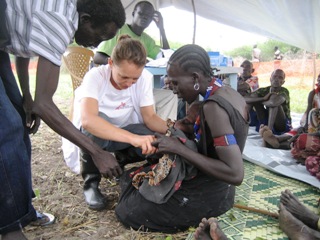MSF warns of deteriorating security in Unity state’s Leer county
March 3, 2014 (BENTIU) – The deteriorating security situation in Leer county and surrounding areas of South Sudan’s Unity state has devastating consequences for thousands of people hiding in bushes, Medecins Sans Frontieres (MSF) warned last week.

“The security situation is worsening every day, living conditions are life-threatening and MSF has now lost contact with two-thirds of its staff,” partly reads the statement.
One MSF staff member explained, “Many people from Leer are here – the community are hungry, food and water are a problem for everyone – people are drinking water from a dirty river. We hide during the day; it is safer for us to move around at night.”
Raphael Gorgeu, MSF’s South Sudan head of mission described the situation on the ground as “chaotic” and “hostile”, adding that it was very difficult to know where civilians fled to.
“The sporadic contact we are able to make with our staff paints a desperate picture for them and the unknown thousands living in terrible conditions, vulnerable to disease, dehydration, malnutrition and attack,” further he stressed.
Meanwhile, MSF staffs are reportedly continuing to care for patients, but said medicines were running out.
Fifteen surgical cases, the international charity said, were still being cared for by the staff, but could no longer change their surgical dressings due to supply shortages.
“The staffs who remain in touch with MSF report that worsening security has pushed them further into the bush. They have split into smaller groups to decrease the chance of attack and divided their supplies of medicines, which they are saving to treat only the most life-threatening cases,” explained Gorgeu.
Last week, one MSF team was reportedly treating at least 45 critically ill patients each day.
“The most common conditions are watery diarrhoea, respiratory tract infections and malaria – conditions that are directly related to the dire living conditions and lack of shelter and mosquito nets,” the agency said, adding “Staff have also reported alarming cases of sexual violence.”
MSF has worked in Leer for the past 25 years, providing outpatient and inpatient care for children and adults, surgery, maternity, HIV/TB treatment, and intensive care.
(ST).
